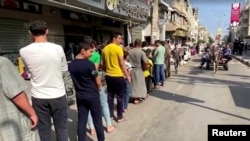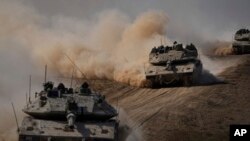The Latest
- Israelis protest near the Defense Ministry in Tel Aviv, accusing the government of failing to protect citizens near Gaza.
- Israeli Prime Minister Benjamin Netanyahu visits Israeli troops at the Gaza border, asking, “Are you ready?”
- Turkey stands with Egypt in rejecting the removal of Palestinians from the Gaza Strip.
- The deadline passes since Israel Defense Forces warned residents of Gaza city and northern areas to evacuate along specified routes.
- The IDF has confirmed that Hamas is holding as hostages more than 120 civilians in Gaza.
- Israeli airstrikes have killed 70 and wounded 200 people evacuating northern Gaza, according to Gaza’s Interior Ministry.
- Israel said that it has hit a Hezbollah target in southern Lebanon.
- The war has claimed at least 3,200 lives on both sides since Hamas launched an incursion on October 7.
The humanitarian crisis is mounting in Gaza as Palestinians scramble Saturday to evacuate from the northern part of the tiny Gaza Strip and head south before an expected Israeli military offensive there.
More than 2 million people are facing an imminent water crisis and lack of other vital supplies in Gaza after Israel stopped the flow of resources into the region.
“It has become a matter of life and death. It is a must; fuel needs to be delivered now into Gaza to make water available for 2 million people,” said Philippe Lazzarini, UNRWA commissioner general.
At the U.N. base in the southern Gaza Strip — where UNRWA has moved its operations — drinking water is also running out. Thousands of people have sought refuge there after Israel issued an evacuation directive from northern Gaza, covering 1.1 million residents, or about half of the territory’s population.
Only in the past 12 hours, hundreds of thousands of people have been displaced. Nearly 1 million people have been displaced in one week alone.
The six-hour window has ended that Israel gave the Gazans to evacuate before its ground attack in the area. The Israel Defense Forces, or IDF, saturated the border with thousands of reservists, troops and military equipment amid a relentless onslaught on the territory, in retaliation for a bloody attack by the militant group Hamas on October 7.
So far, Israeli strikes have killed about 1,800 Palestinians, according to Gaza’s Health Ministry.
Earlier Saturday, IDF spokesperson Lt. Col. Richard Hecht said Israel's air, land and sea blockade on Gaza will continue into a seventh day.
“We are preparing for the next stages," he stated but shared no information about whether it would be a ground incursion.
Israel has vowed to annihilate Hamas after its fighters stormed through towns and villages in southern Israel last week, killing 1,300 Israelis, mainly civilians, and making off with scores of hostages.
U.S. diplomacy
U.S. Secretary of State Antony Blinken called for the protection of civilians in the Gaza Strip and Israel. He was in the United Arab Emirates, his fifth stop in an intensive multinational trip, to stop the war in Israel from expanding across the region.
Blinken also met Saturday with Saudi Foreign Minister Prince Faisal bin Farhan in Riyadh. He emphasized the United States’ unwavering focus on halting terrorist attacks by Hamas against Israel, and he discussed Washington’s continued engagement with regional partners to prevent the spread of conflict in the region and their shared commitment to taking steps to help protect civilians.
In remarks published by the U.S. State Department, the Saudi foreign minister said that "the priority now needs to be to stop further civilian suffering."
"I have to emphasize that the humanitarian situation in Gaza is very, very difficult, and we need to work together to make sure that access for humanitarian relief and humanitarian goods is allowed," Prince Faisal bin Farhan said.
State Department spokesperson Matthew Miller told reporters traveling with him on the plane that Blinken had a “productive” call with China’s Wang Yi Saturday morning before his meeting with the Saudi foreign minister. The secretary urged China to use its influence to achieve that same goal.
Rafah border
Washington has been working with Egypt, Israel and Qatar to open the Rafah border crossing with Egypt on Saturday afternoon to allow Palestinian-Americans to leave, a senior State Department official said earlier.
"We have been trying to facilitate access for it to be open from 12 to five today [Saturday]. The Egyptians, the Israelis and the Qataris have been working with us on that," Miller told reporters traveling with Blinken.
The number of dual Palestinian-American citizens has been estimated at about 500 among the Gaza Strip's population of 2 million. Washington hopes to get many of its nationals out of harm's way.
It was unclear, though, whether Hamas would allow access to the crossing, the official said.
A Saturday report by Israeli newspaper Haaretz said the bodies of several Israelis were retrieved by the Israeli military in Gaza raids, during which troops allegedly destroyed some “terrorist infrastructure and squads,” and found items that might lead to more missing Israelis. Israel’s military said early Saturday it confirmed that more than 120 civilians are being held hostage in Gaza by Hamas.
In Tel Aviv, Israeli army spokesperson Lt. Col. Avichay Adraee told Alhurra, an Arabic language satellite TV sister organization of VOA, “In every sense of the word, we are escalating our raids and attacks on Hamas’ hideouts in the Gaza Strip, and this is what is actually happening, after we targeted geographical areas that Hamas exploited to establish its hideouts there, such as Al-Rimal neighborhood, Beit Hanoun, and so on.
"We are now warning the residents of Gaza City and calling on them to leave those areas because they are being used by Hamas to lead and direct military operations against Israel,” Adraee said. “Therefore, as we said and announced clearly, Israel will intensify its strikes in this region."
Fears of a widening war
“It’s been a dreadful week. Humanity must prevail,” said U.N. Under-Secretary-General for Humanitarian Affairs and Emergency Relief Coordinator Martin Griffiths in a statement on X. “Violence is on the rise in the West Bank with the surge in civilians’ deaths and injuries while in Lebanon the risk of the conflict spilling into the country is a major concern,” he said.
German Chancellor Olaf Scholz agreed in a phone call Saturday with Israel's prime minister that it was important to avoid a wider Middle East war, as well as Hezbollah's intervention in the Israel-Hamas conflict, a spokesperson for the Chancellery said.
"Chancellor Scholz renewed Germany's full solidarity with the people of Israel in these difficult times and emphasized that Germany stands unwaveringly at Israel's side," the spokesperson added in a statement.
Israeli and Lebanese media reported clashes Friday along the countries’ mutual border, where Reuters videographer Issam Abdallah was killed and two of his colleagues were injured in an Israeli artillery strike. Reporters from Agence France-Presse and Al Jazeera also were injured. Reuters said it is “urgently seeking more information.”
VOA White House Correspondent Anita Powell, State Department Correspondent Cindy Saine, U.N. Correspondent Margaret Besheer and Pentagon Correspondent Carla Babb contributed to this report. Some information for this article came Alhurra, as well as from The Associated Press, Agence France-Presse and Reuters.








